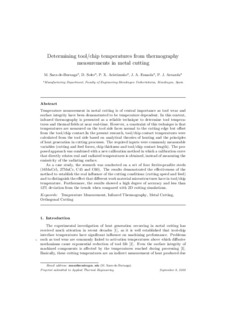| dc.contributor.author | Saez de Buruaga, Mikel | |
| dc.contributor.author | Soler Mallol, Daniel | |
| dc.contributor.author | Aristimuño, Patxi Xabier | |
| dc.contributor.author | Esnaola, Jon Ander | |
| dc.contributor.author | ARRAZOLA, PEDRO JOSE | |
| dc.date.accessioned | 2022-09-01T09:46:22Z | |
| dc.date.available | 2022-09-01T09:46:22Z | |
| dc.date.issued | 2018 | |
| dc.identifier.issn | 1359-4311 | en |
| dc.identifier.other | https://katalogoa.mondragon.edu/janium-bin/janium_login_opac.pl?find&ficha_no=149827 | en |
| dc.identifier.uri | https://hdl.handle.net/20.500.11984/5650 | |
| dc.description.abstract | Temperature measurement in metal cutting is of central importance as tool wear and surface integrity have been demonstrated to be temperature dependent. In this context, infrared thermography is presented as a reliable technique to determine tool temperatures and thermal fields at near real-time. However, a constraint of this technique is that temperatures are measured on the tool side faces normal to the cutting edge but offset from the tool/chip contact. In the present research, tool/chip contact temperatures were calculated from the tool side based on analytical theories of heating and the principles of heat generation in cutting processes. The required inputs were commonly measurable variables (cutting and feed forces, chip thickness and tool/chip contact length). The proposed approach was combined with a new calibration method in which a calibration curve that directly relates real and radiated temperatures is obtained, instead of measuring the emissivity of the radiating surface.
As a case study, the research was conducted on a set of four ferrite-pearlite steels (16MnCr5, 27MnCr, C45 and C60). The results demonstrated the effectiveness of the method to establish the real influence of the cutting conditions (cutting speed and feed) and to distinguish the effect that different work material microstructures have in tool/chip temperature. Furthermore, the results showed a high degree of accuracy and less than 12% deviation from the trends when compared with 2D cutting simulations. | en |
| dc.language.iso | eng | en |
| dc.publisher | Elsevier | en |
| dc.rights | © 2018 Elsevier | en |
| dc.subject | temperature measurement | en |
| dc.subject | Infrared thermography | en |
| dc.subject | Metal cutting | en |
| dc.subject | Orthogonal cutting | en |
| dc.title | Determining tool/chip temperatures from thermography measurements in metal cutting | en |
| dcterms.accessRights | http://purl.org/coar/access_right/c_abf2 | en |
| dcterms.source | Applied Thermal Engineering | en |
| local.contributor.group | Mecanizado de alto rendimiento | es |
| local.description.peerreviewed | false | en |
| local.description.publicationfirstpage | 305 | en |
| local.description.publicationlastpage | 314 | en |
| local.identifier.doi | https://doi.org/10.1016/j.applthermaleng.2018.09.051 | en |
| local.relation.projectID | info:eu-repo/grantAgreement/EC/RFCS/RFSR-CT-2014-00020/EU/Innovative Method dedicated to the development of a ferrite-pearlite grade regarding its Machinability/IMMAC | en |
| local.relation.projectID | info:eu-repo/grantAgreement/GV/Convocatoria de ayudas a la Investigación básica y-o aplicada 2014-2015/PI_2014_1_116/CAPV/Estudio de la influencia de la microestructura de aceros y superaleaciones base níquel en la maquinabilidad e integridad superficial de componentes mecanizados/MICROMAQUINTE | en |
| local.relation.projectID | info:eu-repo/grantAgreement/GE/Programa Estatal de Investigación, Desarrollo e Innovación Orientada a los Retos de la Sociedad, Convocatoria 2015, Modalidad 1: Proyectos de I+D+I/DPI2015-67667-C3-3-R/ES/Modelización y análisis experimental del proceso de mecanizado en la escala micro/EMULATE | en |
| local.source.details | Vol. 145. Pp. 305-314. 25 December, 2018 | en |
| oaire.format.mimetype | application/pdf | |
| oaire.file | $DSPACE\assetstore | |
| oaire.resourceType | http://purl.org/coar/resource_type/c_6501 | en |
| oaire.version | http://purl.org/coar/version/c_71e4c1898caa6e32 | en |







